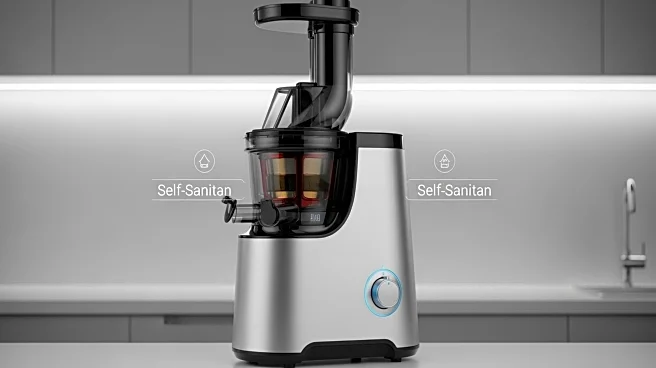What's Happening?
Zumex has introduced the Zitrux, the world's first self-cleaning and self-sanitising juicer, setting a new standard in professional juicing. This innovative product features an advanced system that uses detergent to remove pulp and juice residues, followed
by a disinfection process, ensuring maximum hygiene. The Zitrux can juice up to 40 oranges per minute and includes smart connectivity for remote monitoring and maintenance. This development reflects Zumex's commitment to automation and operational efficiency, offering a unique experience for users and operators.
Why It's Important?
The introduction of the Zitrux juicer represents a significant advancement in the food and beverage industry, particularly in terms of hygiene and efficiency. The self-cleaning and self-sanitising features address common concerns about cleanliness in food preparation, enhancing consumer safety and confidence. For businesses, the automation of cleaning processes reduces labor costs and increases productivity, aligning with industry trends towards smart technology and operational efficiency. This innovation could set a precedent for future developments in kitchen appliances, emphasizing the importance of hygiene and automation.
What's Next?
As the Zitrux gains traction in the market, it may influence other manufacturers to adopt similar technologies, potentially leading to a broader shift towards self-cleaning appliances in the food industry. Zumex's focus on smart connectivity and remote management could also drive further innovations in appliance technology, enhancing user experience and operational control. The company's commitment to hygiene and efficiency may inspire similar advancements across other sectors, promoting a culture of cleanliness and automation.
Beyond the Headlines
The Zitrux's launch highlights the growing importance of hygiene in consumer products, particularly in the wake of global health concerns. The integration of smart technology in kitchen appliances reflects broader trends towards connectivity and automation, which could have long-term implications for consumer behavior and industry standards. The ethical considerations of automation, including its impact on employment and skill requirements, are also worth exploring as these technologies become more prevalent.

















